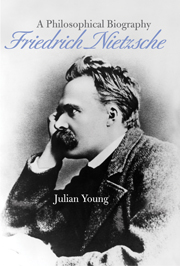Book contents
- Frontmatter
- Contents
- List of Illustrations
- Acknowledgments
- List of Abbreviations
- PART ONE Youth
- PART TWO The Reluctant Professor
- Chapter 6 Basel
- Chapter 7 Richard Wagner and the Birth of The Birth of Tragedy
- Chapter 8 War and Aftermath
- Chapter 9 Anal Philology
- Chapter 10 Untimely Meditations
- Chapter 11 Aimez-vous Brahms?
- Chapter 12 Auf Wiedersehen Bayreuth
- Chapter 13 Sorrento
- Chapter 14 Human, All-Too-Human
- PART THREE The Nomad
- Chronology
- Notes
- Bibliography of Secondary Literature
- Index
- Plate section
Chapter 7 - Richard Wagner and the Birth of The Birth of Tragedy
from PART TWO - The Reluctant Professor
Published online by Cambridge University Press: 07 September 2011
- Frontmatter
- Contents
- List of Illustrations
- Acknowledgments
- List of Abbreviations
- PART ONE Youth
- PART TWO The Reluctant Professor
- Chapter 6 Basel
- Chapter 7 Richard Wagner and the Birth of The Birth of Tragedy
- Chapter 8 War and Aftermath
- Chapter 9 Anal Philology
- Chapter 10 Untimely Meditations
- Chapter 11 Aimez-vous Brahms?
- Chapter 12 Auf Wiedersehen Bayreuth
- Chapter 13 Sorrento
- Chapter 14 Human, All-Too-Human
- PART THREE The Nomad
- Chronology
- Notes
- Bibliography of Secondary Literature
- Index
- Plate section
Summary
For three years, we saw in the previous chapter, Nietzsche was regarded by all concerned as a member of the Tribschen household. Along with emotional warmth and sublime music, Tribschen also provided him with an intensely stimulating philosophical environment, presided over by the spirit of Arthur Schopenhauer. To his ‘wonderfully deep philosophy’ Wagner and Nietzsche were, as we have seen, equally devoted. Nietzsche sent his essays and lectures to the Wagners for discussion and scrutiny and thanked Wagner for the ‘many purely scientific problems’ that resolved themselves through their discussions. And Wagner sent Nietzsche the completed ‘Beethoven’ essay, to which the latter replied, ‘I can make clear to you how much there is for me there by way of learning your philosophy of music – that is, the philosophy of music – in an essay I wrote this summer entitled “The Dionysian Worldview”’ – a preliminary airing of the central themes of Nietzsche's first book. As noted, Cosima was no mere onlooker but rather an active contributor to the intellectual life of Tribschen. A woman of considerable education and perspicacity, she regularly bombarded Nietzsche with salvoes of often searching questions about his philosophical work. In dedicating his Five Prefaces to Five Unwritten Books to her in 1872, he wrote, ‘in deeply felt respect and as an answer to questions raised both by letter and in conversation’.
The product of this emotional and intellectual intimacy was The Birth of Tragedy.
- Type
- Chapter
- Information
- Friedrich NietzscheA Philosophical Biography, pp. 112 - 134Publisher: Cambridge University PressPrint publication year: 2010



